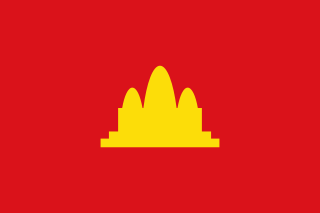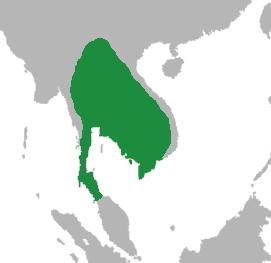The history of Cambodia, a country in mainland Southeast Asia, can be traced back to Indian civilisation. Detailed records of a political structure on the territory of what is now Cambodia first appear in Chinese annals in reference to Funan, a polity that encompassed the southernmost part of the Indochinese peninsula during the 1st to 6th centuries. Centered at the lower Mekong, Funan is noted as the oldest regional Hindu culture, which suggests prolonged socio-economic interaction with maritime trading partners of the Indosphere in the west. By the 6th century a civilisation, called Chenla or Zhenla in Chinese annals, firmly replaced Funan, as it controlled larger, more undulating areas of Indochina and maintained more than a singular centre of power.

Genocide is the intentional action to destroy a people—usually defined as an ethnic, national, racial, or religious group—in whole or in part. A term coined by Raphael Lemkin in his 1944 book Axis Rule in Occupied Europe, the hybrid word geno-cide is a combination of the Greek word γένος and the Latin suffix -caedo.

The Khmer Rouge is the name that was popularly given to members of the Communist Party of Kampuchea (CPK) and by extension to the regime through which the CPK ruled Cambodia between 1975 and 1979. The name was coined in the 1960s by Norodom Sihanouk to describe his country's heterogeneous, communist-led dissidents, with whom he allied after his 1970 overthrow.
Cultural genocide or cultural cleansing is a concept which was distinguished by lawyer Raphael Lemkin in 1944 as a component of genocide. Though the precise definition of cultural genocide remains contested, the Armenian Genocide Museum defines it as "acts and measures undertaken to destroy nations' or ethnic groups' culture through spiritual, national, and cultural destruction."
Edward Samuel Herman was an American economist, media scholar and social critic. Herman is known for his media criticism, in particular his propaganda model hypothesis developed with Noam Chomsky, a frequent co-writer. He held an appointment as Professor Emeritus of finance at the Wharton School of Business of the University of Pennsylvania and a media analyst with a specialty in corporate and regulatory issues as well as political economy. He also taught at Annenberg School for Communication at the University of Pennsylvania.

Khieu Samphan is a Cambodian former communist politician and economist who was the chairman of the state presidium of Democratic Kampuchea (Cambodia) from 1976 until 1979. As such, he served as Cambodia's head of state and was one of the most powerful officials in the Khmer Rouge movement, although Pol Pot remained the General Secretary in the party. Prior to joining the Khmer Rouge, he was a member of Norodom Sihanouk's Sangkum government. After the 1967 leftist rebellion Sihanouk ordered the arrest of leftists including Samphan, who fled into hiding until the Khmer Rouge takeover in 1975. On 7 August 2014, along with other members of the regime, he was convicted and received a life sentence for crimes against humanity during the Cambodian genocide, and a further trial found him guilty of genocide in 2018. He is the last surviving senior member of the Khmer Rouge following the death of Nuon Chea in August 2019 and Kang Kek Iew in September 2020.

Cambodian Americans or Khmer Americans are Americans of Cambodian ancestry, respectively. In addition, Cambodian Americans are also Americans with ancestry of other ethnic groups of Cambodia, such as the Chams and Khmer Loeu peoples.

The Killing Fields are a number of sites in Cambodia where collectively more than a million people were killed and buried by the Khmer Rouge regime during its rule of the country from 1975 to 1979, immediately after the end of the Cambodian Civil War (1970–1975). The mass killings are widely regarded as part of a broad state-sponsored genocide.

Nuon Chea, also known as Long Bunruot or Rungloet Laodi, was a Cambodian communist politician and revolutionary who was the chief ideologist of the Khmer Rouge. He also briefly served as acting Prime Minister of Democratic Kampuchea.

The International Association of Genocide Scholars (IAGS) is an international non-partisan organization that seeks to further research and teaching about the nature, causes, and consequences of genocide, including the Holocaust, the Armenian Genocide, the genocides in Cambodia, Rwanda, Burundi, Bosnia-Herzogovina, Bangladesh, Sudan, and other nations. The IAGS also advances policy studies on the prevention of genocide. The association's members consider comparative research, case studies, links between genocide and other human rights violations, predictive models for prevention of genocide, and tribunals and courts for the punishment of genocide. The organization's membership includes academics, anti-genocide activists, artists, genocide survivors, journalists, jurists, and public policy makers. Membership is open to interested persons worldwide.
Benedict F. Kiernan is an Australian-born American academic and historian who is the Whitney Griswold Professor of History, Professor of International and Area Studies and Director of the Genocide Studies Program at Yale University.

Elizabeth Becker is an American author and journalist who covered national and international affairs as a New York Times correspondent and was a member of the staff that won the 2002 Pulitzer Prize for Public Service. She was the Senior Foreign Editor of National Public Radio where she received two DuPont-Columbia Awards as executive producer for reporting of South Africa's first democratic elections and the Rwanda genocide. She began her career as a war correspondent for The Washington Post covering Cambodia. She is the author of When the War Was Over, a modern history of Cambodia and the Khmer Rouge, for which she won a Robert F. Kennedy book citation.

Kampuchea, officially from 5 January 1976 the Democratic Kampuchea, also described as the Genocidal Regime, was the Cambodian state under a one-party Marxist-Leninist totalitarian dictatorship that existed between 1975 and 1979. It was controlled by the Khmer Rouge (KR), the name popularly given to the followers of the Communist Party of Kampuchea (CPK), and was founded when KR forces defeated the Khmer Republic of Lon Nol in 1975.

The Extraordinary Chambers in the Courts of Cambodia, commonly known as the Cambodia Tribunal or Khmer Rouge Tribunal (សាលាក្ដីខ្មែរក្រហម), is a court established to try the senior leaders and the most responsible members of the Khmer Rouge for alleged violations of international law and serious crimes perpetrated during the Cambodian genocide. Although it is a national court, it was established as part of an agreement between the Royal Government of Cambodia and the United Nations, and its members include both local and foreign judges. It is considered a hybrid court, as the ECCC was created by the government in conjunction with the UN, but remains independent of them, with trials held in Cambodia using Cambodian and international staff. The Cambodian court invites international participation in order to apply international standards.

The Cambodian genocide was the systematic persecution and killing of Cambodians by the Khmer Rouge under the leadership of Communist Party general secretary Pol Pot, who radically pushed Cambodia towards communism. It resulted in the deaths of 1.5 to 2 million people from 1975 to 1979, nearly a quarter of Cambodia's 1975 population.
The following lists events that happened during 2011 in Cambodia.
Cambodian rock of the 1960s and 1970s was a thriving and prolific music scene based in Phnom Penh, Cambodia, in which musicians created a unique sound by combining traditional Cambodian music forms with rock and pop influences from records imported into the country from Latin America, Europe, and the United States. U.S. armed forces radio that had been broadcast to troops stationed nearby during the Vietnam War was also a primary influence. This music scene was abruptly crushed by the Khmer Rouge communists in 1975, and many of its musicians disappeared or were executed during the ensuing Cambodian genocide. Due to its unique sounds and the tragic fate of many of its performers, the Cambodian rock scene has attracted the interest of music historians and record collectors, and the genre gained new popularity upon the international release of numerous compilation albums starting in the late 1990s.

Cambodian irredentism is a nationalist movement in Cambodia that refer to the land that used to be part of the Khmer Empire. The irredentist movement in Cambodia is aimed against the control by Thailand, Vietnam and Laos. Irredentist, official and unofficial Cambodian claims on territories viewed by Cambodians as having been under some form of Cambodian sovereignty, are rhetorically tied back to an accused expansionism.

Genocide is the deliberate and systematic destruction, in whole or in part, of an ethnic, racial, religious or national group. The term was coined in 1944 by Raphael Lemkin. It is defined in Article 2 of the Convention on the Prevention and Punishment of the Crime of Genocide (CPPCG) of 1948 as "any of the following acts committed with intent to destroy, in whole or in part, a national, ethnical, racial or religious group, as such: killing members of the group; causing serious bodily or mental harm to members of the group; deliberately inflicting on the groups conditions of life, calculated to bring about its physical destruction in whole or in part; imposing measures intended to prevent births within the group; [and] forcibly transferring children of the group to another group."











